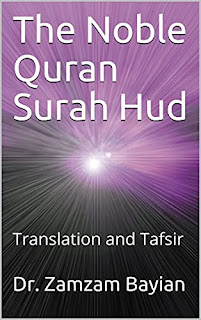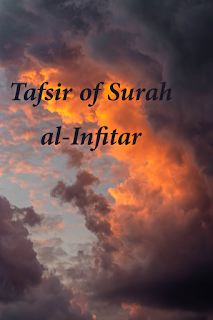Contains 19 Ayah, Revealed in Mecca
Bism-Allah ar-Rahman ar-Rahim
In the Name of Allah, the Giver of Mercy, the Most Merciful
82:1 When the sky splits,
82:2 When the stars scatter,
82:3 When the seas are burst,
82:4 When the graves are overturned,
82:5 Each soul will then know what it has forwarded and withheld.
These ayat describe the horrible events that will take place when the Day of Judgment occurs. The sky will split and crack, the stars will scatter, fall, and disperse, the seas will be burst and all barriers between them will disappear, so they will become one sea, and the graves will be overturned so the dead will come out from them when the Day of Judgment takes place.
When the aforementioned things happen, each soul will know the good and evil deeds that it has forwarded and withheld. It will know the righteous deeds that it has done, which will benefit it. It will also know the wicked deeds that it has done, i.e. evil deeds that people imitate after the doer’s death, obligatory deeds that it has failed to perform, and commands of Allah that it failed to comply with.
The aforementioned things are some of the signs that will take place before the occurrence of the Day of Judgment. Two of which are related to the universe and two are things that will happen on earth. The intended meaning is that the world will be destroyed and end, the time for the reckoning will come, and there will be no opportunity for amending one’s deeds; rather, every soul will be recompensed according to it is deeds, good or evil.
82:5 Each soul will then know what it has forwarded and withheld.
Each soul will know in detail all deeds that it did in the worldly life when the records of deeds will be spread. Thus, the righteous will know the good consequences of righteous deeds they did in the worldly life and the evildoers will know the evil consequences of the sins they did in the worldly life.
After mentioning some of the signs of the Day of Judgment, human beings are addressed.
82:6 O Man, what has deceived you concerning your Lord, the Generous,
82:7 who created you, then perfectly fashioned you, and made you well-proportioned
82:8 and in whatever form He willed He brought you to existence?
The interrogation is for criticism and condemnation of man’s conduct.
O man, you are a weak creature whom Allah, the Able, created. What has deceived you concerning your Lord, the Generous? Why do some people disbelieve in the Oneness of the Creator, Allah? Why do some people worship other gods besides the Creator, Allah, and disobey His commands?
The questioning is for threatening, not for securing answers. The ayah says, ‘Your Lord, the Generous.’ Some people may say that man has been deceived by Allah’s generosity. However, the intended meaning in the ayah is the following: O man, what has deceived you concerning your Lord, the Generous, that you disobey His commands and meet His generosity with ingratitude?
The ayah says ‘Your Lord’ and does not say ‘Allah.’ That is because ‘Your Lord’ implies that Allah, the Creator, has perfect authority and power. Indeed, Allah, the All-Powerful, created man from nothing and gave him countless blessings. Besides, ‘Your Lord’ implies that Allah takes care of man throughout his life. Thus, this Lord deserves thanks and obedience, not ingratitude and disobedience.
[…who created you, then perfectly fashioned you, and made you well-proportioned and in whatever form He willed He brought you to existence?]
Allah created man in the best form and made him well-proportioned without any deformity nor defect. He gave man a moderate stature and proportionate organs, namely, his organs are perfectly created. It should be noted that this refers to the original creation of man, which does not contradict the fact that there are some people with deformities, but they are a minority in comparison with the well-proportionate and healthy people.
O man, what has deceived you concerning your Lord, the Generous? He honored you by creating you in the best form and gave you sound organs that can help you to earn living. Your Lord, the Generous, gave you a moderate stature and proportionate organs. He did not make one of your hands long while the other short, and He did not make some parts of your body black while the rest white. Rather, Allah, the Generous, created you in the best form and perfectly fashioned you.
O man, your Lord, the Generous, brought you to existence in the best form that His will and wisdom ordained.
The intended meaning is to remind man of Allah’s bounties on him, exhort him to worship Allah alone, obey His commands, and avoid His prohibitions. Besides, the ayat imply criticism and reprimand to man for his ingratitude to Allah’s blessings on him and failing to fulfill His obligations on him.
Indeed, creating man in such a beautiful form that function perfectly is something that deserves contemplation and thanking Allah the Giver of all blessings.







